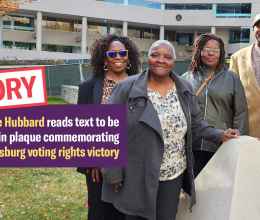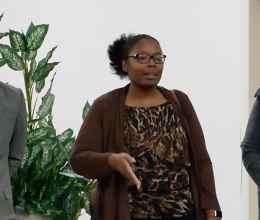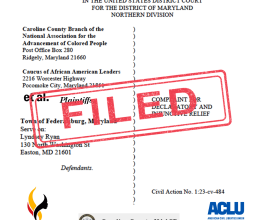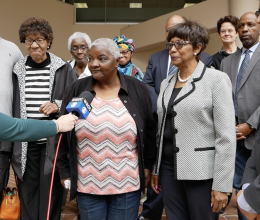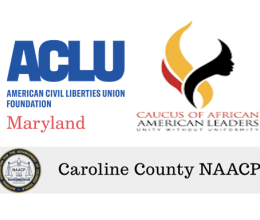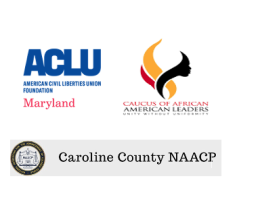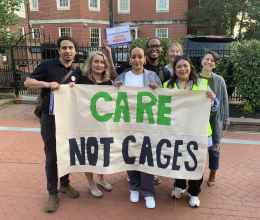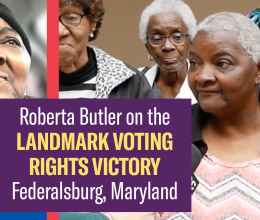
“Our deep sorrow for past wrongs inspires our unwavering commitment to build a better future for all Federalsburg residents.”
Learn more about Caroline County NAACP et al v. Federalsburg
FEDERALSBURG, MD – Adding reconciliation to history-making election reform, a landmark settlement was announced today in a federal lawsuit that challenged 200 years of discrimination against Black voters in the Town of Federalsburg. With a sweeping array of restorative measures, the Town seeks to make amends to Black residents for wrongs of the past. The remarkable agreement – the first of its kind in any Maryland voting rights case – was reached through mediation overseen by U.S. Magistrate Judge Erin Aslan; it includes an official apology for historical racism, a street renaming, and community markers commemorating and celebrating the history and contributions of Black residents, among other measures.
The agreement builds on historic election reform already achieved, with the first-ever election of two Black residents to the Town Council in September under the new, court-approved election system. The plaintiffs in the case are Black voters from Federalsburg – Roberta Butler, Sherone Lewis, Darlene Pitt Hammond, Elaine Hubbard, Nikendra Bordley, Ryan Haynes, and Lywanda Johnson – along with the Caroline County Branch of the NAACP, led by Dr. Willie Woods and Wanda Molock, and the Caucus of African American Leaders, led by Carl Snowden and Rev. James Jones.
Dr. Willie Woods, president of the Caroline County NAACP said: “The mediation deliberations leading to the settlement afforded opportunities for Federalsburg's Black residents and the Town's governance leadership to move forward with greater understanding, unity, and harmony critical to the future success and strength of the Town.”
The unprecedented settlement promises a series of actions by the Town to rectify past wrongs, promote reconciliation, and bring healing to the community:
- The Town will deliver an official, signed apology, which will be framed and permanently displayed at Town Hall.
- The Town will commission a commemorative plaque to be affixed to the building at Town Hall, “From Protest to Progress: Events that Changed the Face of Federalsburg”, celebrating Black voters’ historic voting rights victory.
- The Town will install a photo display at Town Hall, in collaboration with the historical society and the Plaintiffs in this case, featuring Black community contributions to the Town.
- The Town will restore the name Brooklyn Avenue to the portion of the avenue in the Black district renamed Gerardi Boulevard.
- The Town will erect a historical marker in the Black community of Brooklyn celebrating the contributions of the neighborhood's residents and their ancestors.
- The Town will issue a Proclamation naming September 26 of each year as Voting Rights Day in recognition of Black voters' historic win on that day in 2023, the Town's bicentennial year.
- The Town will establish a Town Unity Committee of elected officials and residents from each district to focus on community engagement in future elections and matters related to the promotion, engagement, and enhancement of the Town’s diverse community.
- The Town will establish an annual multicultural celebration.
Sherone Lewis, a plaintiff in the Federalsburg lawsuit said: “According to Psalm 126 - When the Lord brought back the captives to Zion, we were like men who dreamed. Our mouths were filled with laughter, our tongues with songs of joy. Then it was said among the nations, ‘The Lord has done great things for them.’ The Lord has done great things for us, and we are filled with joy. To say that I stand on the shoulders of giants is an understatement. I hope that our forefathers are pleased with what we've accomplished. We are the hope and the dreams that they prayed for. This process has often been as surreal as it has been daunting. I am delighted that we've reached an agreement thus far and look forward to future endeavors to right the wrongs of the past.”
Read the Town of Federalsburg’s Official Apology for Historical Racism:
By this writing, the Town of Federalsburg formally acknowledges responsibility and expresses its deep regret for actions and inactions contributing to racial discrimination and exclusion of Black residents, including its use of an election system that prevented any Black person from holding a position on the Town Council over 200 years. As officials of the Town, we accept moral accountability for the harms these actions inflicted upon Black residents, their families, and ancestors before them.
Black residents have lived in Federalsburg since the Town’s founding in 1823, and today make up a much-valued share of our diverse community. In times past, however, the Town excluded Black residents from full participation in the Town’s political life, working a grave injustice for which we are deeply sorry. As officials and residents of the Town of Federalsburg, we have collective responsibility to build a community based firmly on the principle of equality of opportunity, regardless of one's race or ethnic origin.
Through this expression of regret to those who endured race-based hardship and injustice, we seek to turn the page on this shameful history, and to begin a process of reconciliation among all of the Town’s residents. Our deep sorrow for past wrongs inspires our unwavering commitment to build a better future for all Federalsburg residents. Going forward, we pledge to do all within our power to ensure that such injustices never happen here again, and to embrace all residents of our Town in an inclusive and vibrant community.
Carl Snowden, convenor of the Caucus of African American Leaders, said: “On behalf of the Caucus of African American Leaders, I commend the Town of Federalsburg for settling this federal voting rights case and ensuring that the Black residents of their municipality will be given opportunities for generations to come to elect representatives of their choice. We are particularly pleased that a permanent plaque will be erected to memorialize this important moment in history."
Black residents account for fully 47 percent of Federalsburg’s overall population, yet until this past fall Federalsburg’s government was all-white throughout its history. That is why, in the Town’s Bicentennial year, the plaintiffs challenged Federalsburg’s election practices, including its longstanding use of at-large and staggered elections, as violations of the Voting Rights Act.
Deborah Jeon, legal director for the ACLU of Maryland, said: “Building on the historic election reform already achieved through the determined efforts of Federalsburg’s Black residents, this extraordinary settlement now brings the parties together in a truly remarkable way – one that I have not seen before in over 30 years doing voting rights work across Maryland and the Eastern Shore. Through the Town’s public acknowledgment of its history of past racism, genuine expressions of regret, and by undertaking amends to bring healing to a community that has endured two centuries of racial oppression, officials and residents seize this opportunity to move beyond the wrongs of the past, and toward a new day of equity in Federalsburg.”
Plaintiffs in the case are represented by Nicholas Taichi Steiner and Deborah Jeon of the ACLU of Maryland, along with Cori Schreider, Katie Aber, and Daniel Wolff of the international law firm Crowell & Moring LLP.
Watch "The 2023 Federalsburg Election: History 200 Years in the Making"
